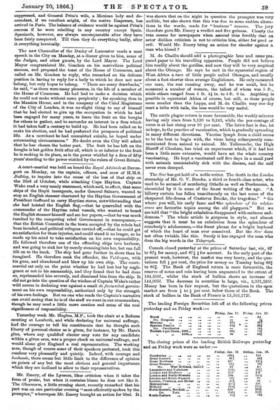A court-martial was held on board the Royal Adelaide at
Devon- port on Monday, on the captain, officers, and crew of H.M.S. Bulldog, to inquire into the cause of the loss of that ship on the 23rd of October, while attacking Cape Haytien. Captain Wake read a very manly statement, which said, in effect, that some ships of the Hayti insurgents, under General Salnave, wanted to stop an English steamer chartered by the Haytian Government of President Geffrard to carry Haytian stores, notwithstanding that .she had hoisted the English flag,—that he quarrelled with the .commander of the Haytian rebel vessels, who wanted to board the English steamer himself and see her papers,—that he was much insulted by the competing rebel Government in consequence,— that the British Consulate in the town occupied by the rebels had been invaded, and political refugees carried off,—that he could get no satisfaction for these injuries, and could stand it no longer, so he made up his mind to take satisfaction on his own responsibility. He followed therefore one of the offending ships into harbour, and was going to sink her by merely steaming into her, but ran full tilt on to the bank. The ship had gone further in shore than he imagined. He therefore sank the offender, the Voldrogue, with his guns, and abandoned and blew up his own ship. The court- martial sat only on the point whether he had lost her by negli- gence or not iu his seamanship, and they found that he had done so, reprimanded him severely, and dismissed him from the ship. It .did not go into the question of the wisdom of Captain Wake's rather course in declaring war against a small de facto rebel govern- ment on his own responsibility, authorized only by the strength of his own feelings. But no one who reads the Captain's narrative can avoid seeing that he is of the stuff we want in our commanders, though he may need a little more caution and sense of the real significance of responsibility.






























 Previous page
Previous page